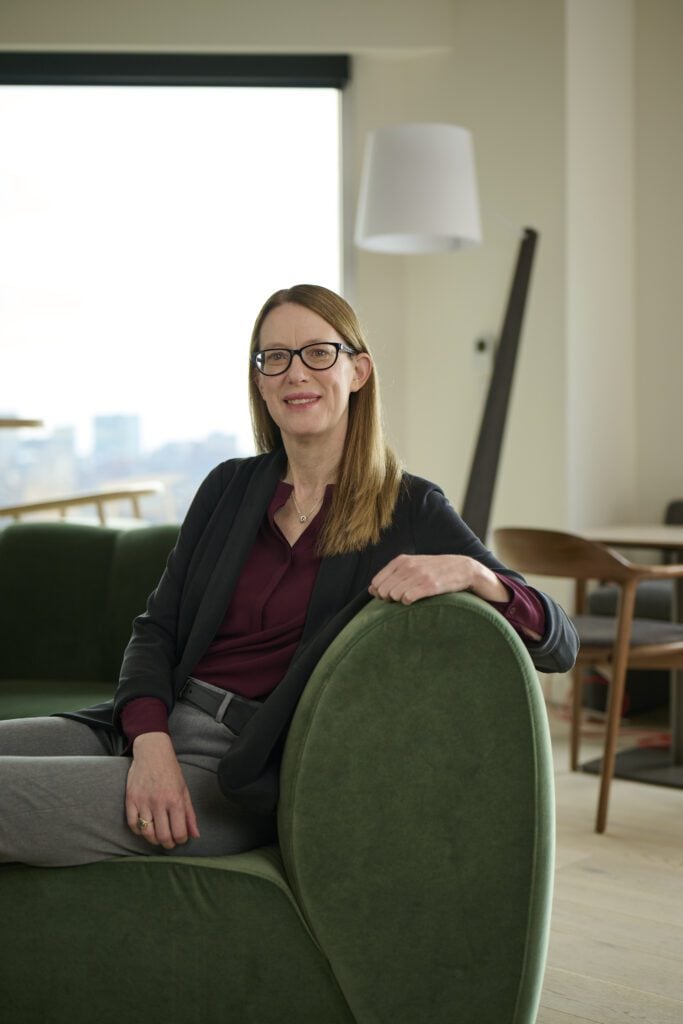
Stacie Weninger, Ph.D has never allowed barriers to define her career, yet she’s a leader by every definition. She serves on Target ALS’s board of directors – and that’s just one bullet point on her extensive resume.
Stacie Weninger, Ph.D., has never been one to follow the beaten path. From her early academic days studying chemistry, to her influential roles in neuroscience, venture capital, and organizational leadership, she has carved a career built on curiosity, adaptability, and a passion for advancing scientific discovery.
As President of the F-Prime Biomedical Research Initiative (FBRI) and a Venture Partner at F-Prime, Dr. Weninger has established herself as a powerhouse in the neuroscience field, spearheading initiatives to develop novel therapeutics for neurodegenerative and psychiatric disorders. She also serves on multiple boards, including Target ALS, reflecting her commitment to collaborative, mission-driven science. Despite Dr. Weninger’s strong presence in the industry today, her journey into leadership was anything but conventional.
A Scientist at Heart, A Visionary in Practice
Dr. Weninger’s passion for science started with chemistry, which she saw as a solid foundation for a broader understanding of the scientific world. However, it was during her Ph.D. and postdoctoral fellowship in neuroscience when she realized her true interest wasn’t confined to a single lab experiment. “I loved thinking about neuroscience broadly,” she reflects. “Doing any one experiment at the bench felt too small to me. I found myself more interested in reading and analyzing research across disciplines than in running another gel.”
That realization led her to a pivotal decision—transitioning from hands-on research to a Senior Scientist role at Cell Press for the journal Neuron, where she was able to engage with groundbreaking research at a high level. “It was a dream job,” she recalls. “I got to work with scientists, shape impactful research, and really contribute to the field in a different way.”
Her career took another turn when she was recruited to lead the Task Force on Women in Science at Harvard, a role she embraced as part of a broader institutional response to gender disparity in STEM. This experience deepened her understanding of the systemic challenges women face in science and helped shape her perspective on mentorship and leadership.
Breaking Barriers and Embracing Opportunity
Despite her impressive trajectory, Dr. Weninger admits that she has often grappled with imposter syndrome. “The biggest challenge has been feeling unqualified,” she shares. “But I’ve always been surrounded by great mentors who were willing to teach me. The key is to push past that feeling and ask, ‘What do I need to learn to do this well?’”
This openness to learning and seizing unexpected opportunities became a defining characteristic of her career. “I never planned to be in venture capital,” she says. “But I gave it a try, telling myself I’d commit for a year. And here I am, two decades later, still passionate about supporting early-stage science and building biotech companies.”
As someone who has worked extensively on issues related to gender equity in STEM, Dr. Weninger takes a nuanced stance on the topic. She acknowledges the progress made in increasing representation but emphasizes that true equity comes from ensuring opportunities are based on merit. “We need to make sure we’re considering all strong candidates,” she asserts. “I don’t believe in lowering the bar for the sake of diversity, but rather in making sure we’re not overlooking exceptional women who deserve a seat at the table.”
She also believes the conversation around women in science should be reframed. “We’ll know we’ve made it when a panel of all women doesn’t raise eyebrows—when people don’t even notice because excellence is the standard.”
Lessons in Leadership and Mentorship
Throughout her career, Dr. Weninger has benefited from informal mentorship, learning by observing and engaging with colleagues. “I never had a formal mentorship program, but I’ve had incredible colleagues who guided me,” she says. She encourages young scientists to do the same—seek out learning opportunities, ask questions, and embrace diverse experiences.
She also underscores the importance of science communication and education. While a graduate student and postdoctoral research fellow, Dr. Weninger was actively involved in undergraduate teaching, winning six teaching awards. “We need a population that can think critically about science,” she says. “I love teaching not just to inspire future scientists, but to ensure that everyone has the ability to engage with scientific issues intelligently.”
For young people considering a career in neuroscience or biotech, Dr. Weninger has clear advice: “A Ph.D. in your area of interest is never a bad idea—it opens doors. But be exploratory. Go to seminars, talk to people in different fields, and keep an open mind about career paths. There are so many ways to make an impact with a science background.”
The Future of Neuroscience and Target ALS
Dr. Weninger’s connection to Target ALS began through an introduction by a fellow scientist, and she was immediately drawn to the foundation’s approach. “Their absolute priority is advancing science,” she explains. “They focus on enabling both academia and industry to collaborate, which is crucial because we need both to develop the type of therapeutics that will change the world.” She became a board member shortly after, a position that she still holds today.
Seeing tremendous potential in the field of neurodegenerative disease research, particularly in the crossover between diseases like ALS and Alzheimer’s, Dr. Weninger says, “We need to stop thinking of these diseases in silos and start understanding them as a continuum. Target ALS is doing an incredible job in fostering these kinds of collaborations.”
Whether through building biotech companies, mentoring future leaders, or shaping the landscape of neuroscience research, Dr. Stacie Weninger is a force for change—both in science and in leadership. Target ALS is honored to have her serve on our board of directors, as someone who aligns seamlessly with our mission to drive meaningful advancements in ALS research and treatment.





